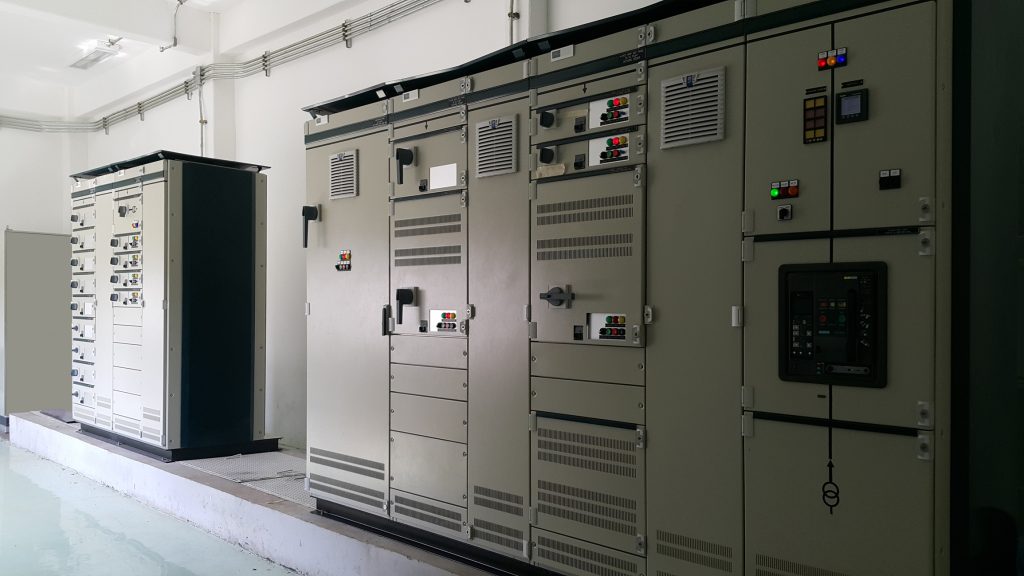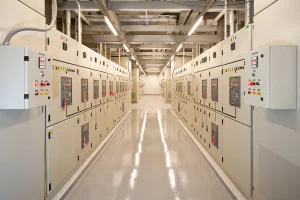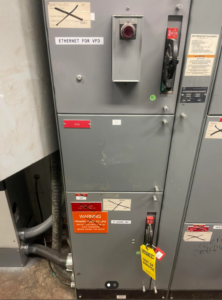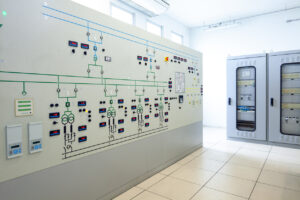Motor Control Centers (MCCs) play a crucial role in industrial automation because they provide centralized control for electric motors. In this article, we discuss types of MCCs, such as conventional, intelligent, and arc-resistant MCCs, including their features, benefits, and typical applications. Understanding the differences between these MCC types can help in selecting the right one for specific operational needs.
What is an MCC?
An MCC is a device in an electrical distribution network that provides protection and control for electrical motors. In a typical industrial setup, there will be several motor-driven machinery and tools. So, monitoring and controlling these motors individually is often not practical, in terms of technical and economical feasibility. As a result, there is a need to provide a central location for monitoring, regulating, and protecting all motor operations. This is what an MCC does. A single MCC can accommodate multiple motors while providing a centralized control for them.
Generally, an MCC contains various components like motor starters, circuit breakers, CTs, PLCs, VFDs, busbars, overload relays, etc. The motor starters facilitate the powering of individual motors, whereas circuit breakers and relays protect the motors from short circuits and overcurrents. Other components like Direct-On-Line (DOL) and Variable Frequency Drives (VFDs) control the speed of motors. This centralized setup also makes repair and inspection straightforward.
Based on operational capabilities and also application, there are three types of MCC, which are conventional, intelligent, and arc-resistant.
Conventional MCC
A typical conventional MCC has one control unit per motor, or in other words, they have individual devices per function. They are connected to process controllers using multi-core cables, thus allowing the exchange of control and status information. But only some measurement information. Any requirement to exchange more data between the process controller and MCC leads would require more cabling as well as associated interface panels. Hence, limiting the amount of monitoring and status indicators that the MCC can provide.
Benefits of Using Conventional MCC
- Simplicity and Reliability: Conventional types of MCC are straightforward, thus making them easy to maintain and highly reliable.
- Cost-Effectiveness: Their lower cost makes them an attractive solution for smaller or less complex operations.
Applications and Examples
| Industry | Application | Examples |
| Manufacturing Plants | Motor control for production machinery | CNC machines, conveyors, mixers, pumps, food and beverage processing, etc. |
| Wastewater Treatment | Operation of treatment equipment | Managing motors for pumps, blowers, and also aerators in water sewage treatment plants. |
| Commercial Buildings | Operation of building systems | Controlling HVAC systems, elevators, and lighting in office buildings, malls, as well as hospitals |
| Mining Operations | Motor control for heavy equipment | Operating motors for crushers, conveyors, and as well as ventilation systems in mining sites |
Intelligent MCC
Instead of hardware cables, intelligent MCCs utilize PROFIBUS communication and digital devices to control and monitor the electrical motors. Moreover, they offer several advanced features over conventional types of MCC, such as automation, real-time monitoring, speed and torque control. Intelligent MCCs include digital communication protocols like Ethernet/IP and Modbus. These protocols allow them to connect seamlessly with other automation systems like PLCs and also SCADA. Key features of intelligent MCCs include:
- Remote Monitoring: It is possible to have remote data monitoring, and also data filtration, which helps in the early detection of operational issues.
- Control Algorithms: These MCCs allow the use of fixed algorithms to start, stop, as well as perform control functions on the system.
- Intelligent Maintenance: They not only monitor the current load but also track vibration, thermal instability, and other possible defects through sensors. As a result, preventing any major faults in the system.
Benefits of Using Intelligent MCC
- Superior Protection: Early warnings and automatic shut-downs in case of critical faults, provide better protection and can extend equipment lifespan.
- High Efficiency: The automation and real-time control of the motor leads to precise as well as fast operations.
- Easy Expansion: You can incorporate several new infrastructures without affecting the operation of existing ones. Therefore minimizing downtime.
Courtesy: LinkedIn
Applications and Examples
| Industry | Application | Examples |
| Chemical Processing | Integration with DCS, remote monitoring, and also scalable intelligence. | Reactors, pumps, agitators, and distillation columns. |
| Manufacturing Facilities | Centralized monitoring, high-resistance grounding, as well as fault detection. | CNC machines, conveyors, mixers, and compressors. |
| Food and Beverage | Redundant network connections, uninterrupted operations, and also 24/7 monitoring. | Packaging machines, refrigeration units, bottling lines. |
| Cement Production | Motor protection, power reliability, and also reduced commissioning time. | Kilns, crushers, conveyors, baghouses, etc. |
| Wastewater Treatment | Remote pump monitoring, early issue detection, and reduced physical inspections. | Pumps, sludge processing units, etc. |
Arc-Resistant MCC
Arc-resistant MCCs are specifically designed to withstand and contain arc flash events, which are dangerous. Moreover, these MCCs have reinforced enclosures and specialized venting systems to protect personnel and equipment from arc flashes.
Courtesy: Toshiba
Features
- High-Performance Enclosure: The enclosure of arc-resistant MCC is made from heavy-duty steel as well as other reinforced materials. Therefore, they can withstand the high pressures and temperatures generated during an arc flash.
- Vents and Flaps: The MCC is equipped with vents and flaps at strategic locations. As a result, they can release pressure and gasses generated during an arc flash.
- Arc Chutes: The arc chutes direct the arc energy into a safe zone, usually through a chimney or ductwork.
- Insulated Barriers: These barriers are placed between different sections of the MCC to prevent the arc flash from spreading.
Benefits of Using Arc Resistant MCC
- Prevention and Protection: Arc-resistant MCCs safeguard employees against injuries from electric shock, arc flash burns, as well as arc blasts.
- Compliance with Safety Standards: These MCCs meet stringent industry safety standards, such as IEEE C37.20.7.
- Minimal Equipment Damage: As Arc-resistant MCCs prevent the arc from spreading, they reduce repair costs and also extend the lifespan of electrical equipment.
Applications and Examples
| Industry | Applications | Examples |
| Oil & Gas | Protection against arc flash hazards in volatile environments. | Refineries, drilling rigs, and petrochemical plants. |
| Utilities | They ensure uninterrupted power distribution and also safety. | Substations, power generation facilities. |
| Industrial Manufacturing | Safety and also continuity in production processes. | Automotive plants, steel mills, as well as aerospace manufacturing. |
| Water and Wastewater | Safe operation and precise control of plants | Water treatment plants, wastewater facilities, etc. |
| Mining | Protecting workers as well as equipment in harsh mining environments. | Underground mines and also mineral processing plants. |
| Commercial | Safeguarding electrical systems in commercial buildings. | Shopping malls, office buildings, data centers, etc. |
Comparison of MCC Types
| Criteria | Conventional MCCs | Intelligent MCCs | Arc-Resistant MCCs |
| Safety | Basic safety features with standard enclosures | Advanced monitoring with fault detection | High safety with arc flash containment |
| Monitoring Capabilities | Limited to basic motor status | Real-time monitoring, remote access, and also in-built diagnostics | Limited, but focuses on safety during arc events |
| Ease of Maintenance | Easy to maintain, simple design | Requires specialized skills for maintenance | Moderate, with additional safety protocols |
| Technological Integration | Minimal, primarily hardware-based control | Supports integration with PLCs, SCADA, also DCS | Focused on safety rather than automation |
| Cost | Offers lowest cost because of the simple design | Higher initial cost due to advanced features | High cost due to specialized safety design |
| Typical Applications | Manufacturing, wastewater treatment, and also buildings | Chemical processing, manufacturing, as well as food and beverage | Oil & gas, utilities, and also industrial manufacturing |
Choosing the Right MCC
Choosing the right type of MCC for your applications requires careful consideration of operational needs, safety requirements, and also technological capabilities.
Here is a guide to help you choose the right MCC.
Assess Operational Requirements
First, determine your application scenario and corresponding MCC requirements, such as load types, and starting and stopping methods. Other considerations include voltage and current rating as well as operational environment. Meanwhile, consider MCCs with appropriate enclosures (NEMA or IEC standards) to withstand dust, moisture, or corrosive substances in hazardous environments.
Evaluate Safety Requirements
If personnel safety is a priority, then consider arc-resistant MCCs. Because these MCCs are designed to contain and redirect arc energy, minimizing the risk to operators. Whereas, if accuracy matters, intelligent MCCs can be a suitable option. Consequently, conventional applications can serve for basic heavy-duty equipment or networks.
Technological Capabilities
If your facility utilizes advanced automation, then utilize an Intelligent MCC to support integration with control systems like PLCs, SCADA, or DCS. In addition, consider other capabilities like energy efficiency, built-in diagnostics, and ease of maintenance.
Compliance with Standards
Does your factory or any other installation require specific industry standards? If yes then consult the relevant industry standards such as IEEE, ANSI, NFPA 70E, and IEC. You can also conduct an arc flash risk assessment as per NFPA 70E and IEEE 1584 guidelines. This test helps to determine the appropriate PPE, safe working distances, as well as necessary MCC features.







